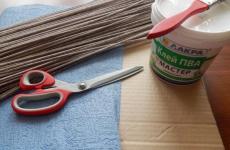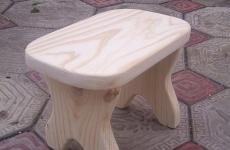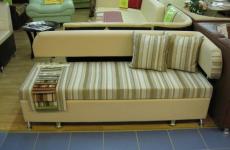Private house or apartment? An overview of the pros and cons of acquisition and exploitation. Pros and cons We get along in a very small apartment
Many people dream of living in their own home. Most of them are dominated by those who grew up in small apartments and remember bright moments from childhood about trips to the country for barbecue. Team today Aykyu Review Discuss the pros and cons of your home versus an apartment.
Private house or apartment - compare the pros and cons
Opponents of apartments see them as in this picture:
regular patio
Panel five-story building with a dirty entrance, noisy neighbors, painted walls. Yes, I don't really want to live in one of the cells of this commublock. To begin with, let's collect all the minuses of apartments in one list.
Cons of living in an apartment:
- neighbors, among whom there may be brawlers and drunks;
- noise from the street;
- high monthly utility bills;
- low ceilings;
- small area;
- lack of greenery;
- parking problems;
- some social pressure on your private life;
- gas pollution and poor ecology;
- high price per square meter;
- difficult to keep pets.
But if things were that bad, people would settle in houses at any cost. So there are significant benefits!
Advantages of the apartment:
- household infrastructure within walking distance;
- good transport accessibility;
- fast internet;
- delivery from online stores and cafes;
- mail is not lost and arrives quickly;
- greater security from robbers;
- central communications;
- significantly higher fire safety;
- all street and common building problems are solved by public utilities;
- it’s easier to leave an apartment empty for a long time - homeless people won’t get in there;
- the apartment is easier to rent;
- you can also sell it faster, the market is more liquid;
- when demolishing a house, the state is obliged to buy your apartment at a market price or provide an equivalent one.
We figured out the apartments, now let's talk about private houses. A private house is presented to Russian inhabitants as a palace. "My home is my castle!". This stems from the Soviet mentality and historical housing problems.
 My home is my castle!
My home is my castle! Pros of your home:
- you can't see or hear your neighbors;
- large living area;
- own land;
- greenery, clean air;
- no noise from the street;
- plenty of parking space, you can have several cars;
- low price per square meter;
- you can have several pets;
- certain status in society.
There aren't really many pros. And what about the minuses, why don't people massively move out of town?
Cons of a private house:
- repair at your own expense;
- care of the territory at their own expense;
- laying communications at their own expense;
- terrible transport accessibility;
- there is no infrastructure within walking distance, except for the general store;
- food delivery is often impossible;
- the post office does not work well when there is one old postman for the whole village;
- living alone is scary;
- cannot be left empty for half a year, it can become a refuge for the homeless;
- when the house is dilapidated, no one will give you a new one;
- dear land;
- often bad internet - ADSL or Iota in general;
- everything constantly overgrows and looks neglected if you do not follow the site;
- self-cleaning snow in winter;
- frequent power outages - after any hurricane, the private sector is without electricity, first of all, the lines leading to high-rise buildings are being repaired;
- cleaning a larger area is harder for a housewife, in spring and autumn all the dirt is dragged into the hallway.
Did you notice a pattern here? If you have not noticed, then let's on the fingers.
All the disadvantages of an apartment in practice come down to a small area, unimportant ecology and poor sound insulation. That is it cons related to the additional comfort of living. If you take a private house, then the main complaints against it are the high cost and complexity of operation, coupled with poor infrastructure .
From here, we come to the old folk wisdom that you have to pay for comfort. How does this translate into practice?
“My parents have long moved from Moscow to a cottage in the suburbs. I have a pretty clear idea about the problems of a private house, I don’t want one for myself. Let's start with the cost. A normal cottage costs from 20 million rubles. I will not say how much more expensive ours is, it does not matter. It is important that all the decent land near the city, from where you can get to Moscow in a short period of time, is worth its weight in gold. At the same time, having invested so much money, you can rent it for well, thousands for 80-100 per month, and then if you find a client. Basically, you can rent only for the summer season. If you try to sell the house for a normal price, and not for a penny, this operation can take 2-3 years. Already from here it is clear that cottages are no investment. Go ahead.
Operating costs . Do you think there are no utility bills for your house? We receive bills "for watering, for livestock." As I saw it, I was taken aback. I say, they say, mom, what kind of watering, you haven’t planted a single bush in your life. Is cattle a shepherd or what? To which the answer followed - it's easier to pay than to make trouble with them. Central electricity, central water supply. There are no bills only for overhaul, which you do at your own expense, and it costs many times more than in an apartment.
Every winter about 4-5 times, a snowplow is called for 4-5 thousand rubles, simply because the gate is covered with snow, and the car cannot leave. Two years ago, my parents got tired of it, and they bought some kind of self-propelled snowplow for one and a half thousand dollars stupidly to clean the paths on the site.
In summer the situation is no better.. Every time I visit my parents, I hear amazing stories about Uzbeks who are on the site almost all the time. They cut branches, mow lawns, hang wind-blown wires from the intercom, and so on. But they don't have their own Uzbeks. And many neighbors were tired of paying 2-3 thousand for each sneeze, they simply built houses on the site and settled servants there with a monthly salary and year-round living.
On the asphalt road up to the gate, the neighbors threw off a thousand dollars each. And not all, but only normal. All sorts of Soviet grandfathers who had no money simply refused to pay and got a road for free, like land in their time. For 7 years it was gouged and it is necessary to make a new one. It is worth building a private road, KAMAZ trucks will surely rumble along it 10 times a day, an interesting everyday observation.
External fence it cost, I don’t remember how much, but it’s expensive, the prices are in thousands of dollars. They decided not to spend money on internal fences, they are wooden. It is interesting here that no one repairs them until they collapse, and then a scandal begins - who should pay. If you think that you will not communicate with neighbors in a private house, this is a delusion. Saved on land - got poor neighbors with whom you have to constantly fight. Well, if you have so much money that you don’t need to save on land, you can build three-meter stone fences around the entire perimeter - just go, congratulations. Another option is unnecessarily "cool" neighbors. A neighbor across the street broke the lawn near the fence and dug in concrete poles, as if it were his personal land, now it is inconvenient to drive through the gate by car. There are also those who “mow down” under the steep ones, who take a small plot and build four-story houses close to the fence - and then you look at them through the windows.
Repair. Somehow the wiring burned out from a voltage drop or something else, I don’t remember. Once the TV burned out in a thunderstorm, this does not happen in apartments. It cost 70 thousand to replace the wiring - one thousand per point. In my apartment, I did an electrician for 300 rubles per point. If the master finds out that you have a house, you automatically "get on the loot." At home in Russia only the bourgeois, the bourgeois must suffer. Such is the logic of the working people.
Personally, I do not plan to buy and build any houses for myself. The love of my life - high-rise apartments with panoramic views of the water. A small studio on the fortieth floor is better than any huge cottage, just because you live higher and have a better view from the window than 39 families downstairs.
 High building
High building A private house in Russia is a good option for pensioners who have nothing to do and who like to dig in the ground, fix fences, etc. In addition, in Russia there are almost no normal cottage settlements (except for super-elite ones with wild prices). So problems with transport, infrastructure and local drunks are provided. The Russian suburbs have nothing to do with the European or American ones you see in films.
History of living in a private house Alexander shared:
“I was 13 when the family moved from a kopeck piece in a city near Moscow to a private house in the suburbs, inherited from my grandfather. Private houses are designed specifically for the elderly, they are not suitable for families with growing children. If you are a married couple and hate your child, it's time to move to a private house, preferably a wreck and away from the city.
The apartment, which was half registered in my name, my mother sold (in guardianship she told me to agree, because my mother knows better) for 25 thousand dollars and used the money to repair the house. Since she had no experience of repair, the repair was delayed ... well, how should I say it ... forever, because they decided to seriously reconstruct the house, and there was not enough money. By the way, this was just before the start of the real estate boom, and in 5 years my apartment would be worth $100,000. But that's not the point.
We had wires hanging in the corridor, Ilyich's light bulbs, in the kitchen, for which there was not enough money, my grandmother pasted 12 types of different wallpapers from the remnants obtained somewhere back in times of shortage. In general, there was enough money, judging visually, only for a fence, sheathing of internal walls with clapboard, partial replacement of furniture and partial redevelopment. After 2 years, this lining dried out and hung half a meter over my father's bed, threatening to break his head at one fine moment.
From the outside, the house looked pretty, and the large green area made a pleasant impression at first. But inside… Firstly, I was ashamed to invite friends or a girl to such a hut. Secondly, no one would go there for 5 kilometers. Everyone gathered in apartments, everyone lived near the school. And I had to get to her every day. Thirdly, private houses are built with adjoining rooms. Every time I needed to go to the toilet at night, I was sure to disturb someone, wake someone up by stumbling. Everything creaks when walking, silence at night, it is impossible to walk quietly.
Then I had to go to the institute from this hole, spending 4 hours a day on the road (I didn’t go to the hostel according to the territorial minimum of distance). How I envied classmates living in apartments next to transport! My parents didn't have money for a rent for me. In general, I got out of this hell as soon as I could. Now I have my own little odnushka, I would not exchange it for any houses in the outback.
Garden, garden, own land - it's all great. When you are over 50. The worst thing you can do with your youth is to spend it in a private house. If I ever buy myself a house, it will be at least a cottage with a private pond, landscaping and fountains. Otherwise, the poorest one-room apartment is better than your own house.”
About the risks of owning your own home says Marina:
“For 10 years, two houses of our neighbors burned down. Both were struck by lightning. Both are wooden, located within a radius of 300 meters from ours. It’s good that it’s not in ours, we don’t have the money to rebuild, we also have a wooden house. There is a lightning rod, I don’t know how it works, but it’s calmer with it. Be sure to install a lightning rod. One hostess went mad with grief. They built a new, smaller house a long time ago, but now she stands on the road and begs every day. She was a decent woman, hardworking.”
 This is what happens without a lightning rod
This is what happens without a lightning rod The cost of maintaining your home
The cottage is good in theory. In practice, this is a black hole into which money, time and effort will go.
Annual expenses:
- lawn mowing;
- pruning branches;
- garbage collection;
- utilities of the central network;
- in a cottage settlement payment for the services of a management company;
- snow removal;
- light in the yard;
- property tax.
Periodic repair costs:
- fence repair;
- painting or cladding of the facade;
- internal work;
- repair of sagging and rotten elements (gate, porch, doors, gates, window frames);
- replacement of wires after hurricanes (intercom, lights).
If you bought a plot and are building a cottage from scratch, we will talk about communications.
If there are no communications, they must be brought, and this:
- water pipes;
- gas pipeline;
- landline telephone on request;
- Internet;
- connection to the mains;
- sewerage or septic tank;
- asphalt road to the entrance to the gate.
All this is insanely expensive in Russia. But these costs are not enough. The owner will have to “bring it to mind” all the time. This mainly concerns issues of convenience, security and autonomy.
Perhaps you will sooner or later spend money on:
- installation of lights on the site;
- video intercom;
- lawn mower;
- snowplow;
- leaf harvester;
- diesel generator;
- water pump;
- solar panels;
- fruit trees and shrubs;
- paving slabs;
- elements of landscape design;
- surveillance cameras;
- alarm (panic button);
- smart home systems;
- lightning rod;
- satellite TV.
The list is not complete, we do not even take into account outbuildings such as a greenhouse, a guest house, a garage, a workshop and a sauna.
Summing up , we note that the maintenance of a normal house, not a wreck, costs an average of 100 to 400 thousand rubles a year, if there are no servants and do not do all the work by hand. Everything is individual. It may be that this year you will spend 10 thousand, next 15, and in the third year something will happen, and you will urgently need to look for 300 “pieces”. The costs here are unpredictable. This is much higher than a communal apartment in the city.
 Winter in a private house
Winter in a private house In your house is also bad, at a high price you can’t sell it and don’t hand it over quickly. In general, a cottage in Russia is a pleasure for accomplished people of pre-retirement age who have no problems with money and who do not have to go to work in the city every day. Therefore, do not be surprised the next time you see an ad "I will change my house to an apartment." Squirrels and greens are great, but not everyone can afford it!
Opponents and supporters of living in a private house have long been fiercely arguing about what is still better: a three-room paradise with all amenities or six acres with a house in the fresh air? The arguments of both sides are very weighty, but often purely individual.
In the last decade, the number of fans of country life has noticeably increased in our country, cottage settlements around large cities are growing like mushrooms, and there are more and more people who want to build their own house and leave the noisy city. But even in high-rise buildings of new buildings, apartments are being bought up at a great speed, the cost per square meter of housing is becoming more expensive every year, and young families are happy to take it.
It is difficult to unequivocally answer the question of what is more suitable for permanent residence: a house or an apartment. Each of these options has its own advantages and disadvantages. And before making a final decision, it is worth carefully studying all the pros and cons. Then later you will not have to regret the step taken.
Pros of living in an apartment
Living conditions in large and small cities, of course, are very different from each other. Huge metropolitan areas with developed infrastructure are not at all like quiet and cozy provincial towns where everyone knows each other. Therefore, it is always worth considering the fact where the apartment is located, in which area, in which house and in which city. A lot can depend on this, but apartments have something in common.
- Firstly, it is the presence of transport infrastructure near the house. This important fact allows you to feel confident enough for those who have to go to work every morning. Living outside the city, it will be necessary to somehow resolve this issue. Lack of a car or huge traffic jams at the entrance to the city can be a serious obstacle to moving to the private sector.
- Secondly, it is the location near the house of important social facilities. Kindergartens, schools, technical schools, institutes, hospitals, pharmacies, sports centers, children's art houses greatly simplify the life of a family with children of any age. The need to take the child to school or kindergarten every day in the morning and evening often calls into question the possibility of living outside the city of a family in which both parents work from morning to evening.
- Thirdly, the apartments are provided with centralized communications services. All issues related to the supply of water, electricity, gas, as well as concerns about waste disposal and wastewater disposal fall on the shoulders of specialized services. It is enough for the owners of apartments to simply pay the receipts on time and not worry about anything else. The issues of replacing pipes in risers, repairing the roof, clearing snow in the yard or ensuring cleanliness in the entrance should be addressed by the relevant persons in the prescribed manner.
- Fourth, cities have shops, entertainment and shopping centers, theatres, exhibitions, cinemas, concert halls, clubs and other cultural facilities that are almost completely absent in the private sector or rural areas.
- Fifth, a serious argument for many is the ability to connect to high-speed Internet, digital television and other information achievements of civilization.
All these factors very often become decisive when a family faces a serious question about what to choose, a house or an apartment. But living in a city apartment has its significant drawbacks.
Cons of living in an apartment
Not all the minuses are noticed by everyone who lives in the apartment. But in most cases, those who consciously chose to live in a private home give the following reasons.
- High cost of utilities. The receipts take into account not only the data of the meters, but also the costs for common house needs are distributed, and a fee is charged for the overhaul of the house. Very often the rent for a small two-room apartment turns out to be much higher than all the costs of maintaining a 100m 2 house.
- Dependence on those who live in neighboring apartments. Problems such as: noisy neighbors, damaged repairs, which were arranged by those who live on the floor above, those who like to drink or smoke in the stairwell are very frequent companions of those who live in an apartment building.
- Strong air pollution, constant noise from passing cars, lack of parking spaces in the yard and many other things also do not add joy.
When making a choice between a house or an apartment, the pros and cons of which are different for each person, all possible difficulties should be foreseen.
Advantages of living in a private house and disadvantages
Among the fans of living in their own home there are people of different ages and marital status. Someone consciously tried all his life to get away from the noisy city, and some were simply forced to take such a step due to various circumstances. But according to experienced realtors, people are more likely to change their apartment for a house, rather than vice versa.
The advantages of living in a private house for many are too obvious:
- fresh air, proximity to nature, peace and quiet of country life;
- a sense of freedom, lack of dependence on neighbors, the ability to go out into the yard at any time and do what you love;
- the presence of its own parking space for a car, motorcycle, bicycle or any other equipment;
- a great opportunity to put a small child to sleep every day in a stroller in the courtyard of the house, without the need to walk with him through the dusty streets of the city for several hours in a row;
- you can have any pets, the maintenance of which in the apartment would be very problematic;
- the presence of a garden and a vegetable garden allows you to grow organic fruits, vegetables and berries, which in the summer can be eaten directly from branches or beds;
- relative independence from utilities, the ability to independently set heating and hot water supply modes, the absence of summer “pressure tests” and frequent shutdowns of hot water supply;
- with properly organized heat supply, maintaining a house is many times cheaper than paying utility bills for an apartment of a smaller area.
The issue of the cost of utilities for many is very relevant. Therefore, when deciding what is cheaper, a house or an apartment, one should definitely take into account the difference in their area, as well as the fact that the house will have to pay only for what was really used.
If the house is built with high quality, well insulated and heated with modern equipment, then there will be no problems with it. Therefore, when buying or building a house, special attention should be paid to the quality of communications.
But living outside the city has its own small drawbacks, which often stop many city dwellers from moving.
A private house. Are there any disadvantages?
The first and most important drawback of living in the private sector is considered by many to be remoteness from all the benefits of civilization. The lack of transport, schools, kindergartens, hospitals, shops, pharmacies and other attributes of urban life makes those who want to escape from the hustle and bustle of the big city seriously think about whether it is worth it.
In addition, your house requires more attention than an apartment. In winter, you need to remove snow in the yard, sweep fallen leaves in autumn, mow grass in summer, repair the roof if necessary, change plumbing, and monitor the condition of all communications. If you do not do all this regularly, then very soon even the strongest and most well-built house will begin to fall into disrepair.
Caring for a personal plot can also take quite a lot of time, so if the parents work in the family, then it may not be easy for them to maintain the garden in good condition.
But for many, such work is only a joy. Everyone must decide for himself how it corresponds to life in a private house. However, there are certain categories of citizens who will find it difficult to adapt to living in such conditions, these are:
- single unmarried women or young mothers with children;
- elderly or infirm people suffering from serious illnesses;
- young families with small children, in which adults work in the city, and children attend kindergarten or school;
- men or women who do not like physical labor and prefer watching TV in the evenings to snow removal.
There is no single and correct decision for everyone about what is better - a house or an apartment. There are a lot of fans of both options, and each gives very convincing arguments. Each person must make his own choice and determine his own destiny.
Each person has a different level of income. This means that housing is not the same for everyone. Someone can afford a luxurious house, and someone can afford a small one-room apartment. If the living area is minimal, then this can adversely affect the state of human health.
What happens to the tenants of a small apartment?

It seems that small housing is no different (except for the area) from spacious apartments, but this is not so. Although a small apartment has everything you need, there can be cramped living conditions. In other words, you will feel uncomfortable, which will negatively affect your health.
If you believe the latest research by scientists, then we can conclude that cramped living conditions do not have the best effect on psychological health. The more people live in one small apartment, the worse it is for them. Such conditions have a very bad effect on small tenants. Children can grow up closed, not very sociable, with complexes. The physical health of the child also suffers.
People who have chosen too small an apartment for life suffer from acute and chronic diseases. If the minimum number of square meters falls on each person, then the risk of stress, neuroses and even alcoholism increases. Scientists believe that cramped living conditions can be one of the causes of frequent infectious diseases. To prove this fact is very simple: in a spacious room, the air environment is better.
What should be the optimal area?
It is not entirely correct to say that living in a one-room apartment is bad for all people. If each person has his own personal space, then no problems will arise. The house should be such that all family members can live in it without problems. There are certain social norms for living space, but in addition to this, there are also physical and hygienic and. The architects found that the minimum number of square meters for one tenant is 14.7.
According to research by scientists who deal with hygiene issues, it turned out that the area per tenant should be approximately 9 square meters. This is the smallest value, the higher it is, the better.
First of all, this indicator depends on the size of the family:
If 2 people live in the apartment, then its area should be 20-25 meters;
For a family of 3 people, you will need 30-35 square meters;
When 4 people live in an apartment, an area of \u200b\u200b40 square meters or more is considered optimal.
If a person cannot have his own personal space or "comfort zone", then he will become angry, irritable. Over time, feelings of anxiety, discomfort, irritability appear. Cramped living conditions can cause quarrels with loved ones. Sometimes many of us dream of being alone, and in a very small apartment this is impossible.
When it comes to a home, bigger doesn't always mean better. Many people think that living in an apartment is a minus, but a small space has many pluses. Even a small apartment can be a great place to express your individuality, plus it's practical and saves money. So, what are the advantages of such housing? Let's find out!
You choose furniture more carefully
This may seem like a minus to some, but in fact, carefully choosing furniture is a great way to ensure that your home will look exactly the way you personally want it to look. If you only have room for one interesting chair, you'll be looking for the perfect one. No less carefully will you approach the choice of pictures and other decorative elements for the room. This allows you to save money and ensures that you do not buy anything that is useless or that you are not too happy with.

You need less to clean and fix
One of the advantages of small homes is that they require less cleaning. A small room is easier to keep in order, you will have more time for other activities. For anyone who values their time highly, this advantage will make a huge difference.

It's easier for you to change the style of the rooms
If you have a small house, you have fewer items, so decorating is much easier. You can just change a couple of pillows, accessories, replace the carpet. All this will instantly transform the room. It is almost impossible to transform a large room with a few details, so it will be more difficult for you to freshen up the atmosphere in your home.

You can get creative with storage
In a small apartment, you will quickly learn how to use the space to the maximum. If you can't place something horizontally, you can try vertically! For example, use shelves instead of bedside tables or place them above the TV. You can use the space while creating a harmonious look. Thoughtful solutions also look decorative, which can be called a separate advantage.

You don't have useless space
In a large house, a room can go unused because there is too much space and there is no need to think about how to use it. In a small apartment, every corner has its own meaning. Whether you're using storage space or creating an office in your bedroom, one way or another, nothing in your home is empty.

You are more realistic about your needs
A small home has fewer storage options, so you have to be smart about the things you buy. If you find it difficult to get rid of unnecessary things, the lack of space will simply force you to do it. With limited space, priorities become immediately apparent. You will be able to evaluate your property and refuse unnecessary things that take up valuable space. In the future, this will also save you from pointless spending.

It is easier for you to create a harmonious design
Most of us have certain preferences regarding the style that rooms should endure. If there are a lot of rooms, they may not look too harmonious. If the space is small, it is much easier to keep everything in the same spirit. Your home looks elegant and thoughtful.

You can use the original decor options
A small space opens up the reserves of creativity in you. You have to use your imagination to decorate and use the room functionally. Thanks to this, you create an environment in your home that perfectly reflects your personality. To achieve the same in a much more spacious room will be more difficult.






